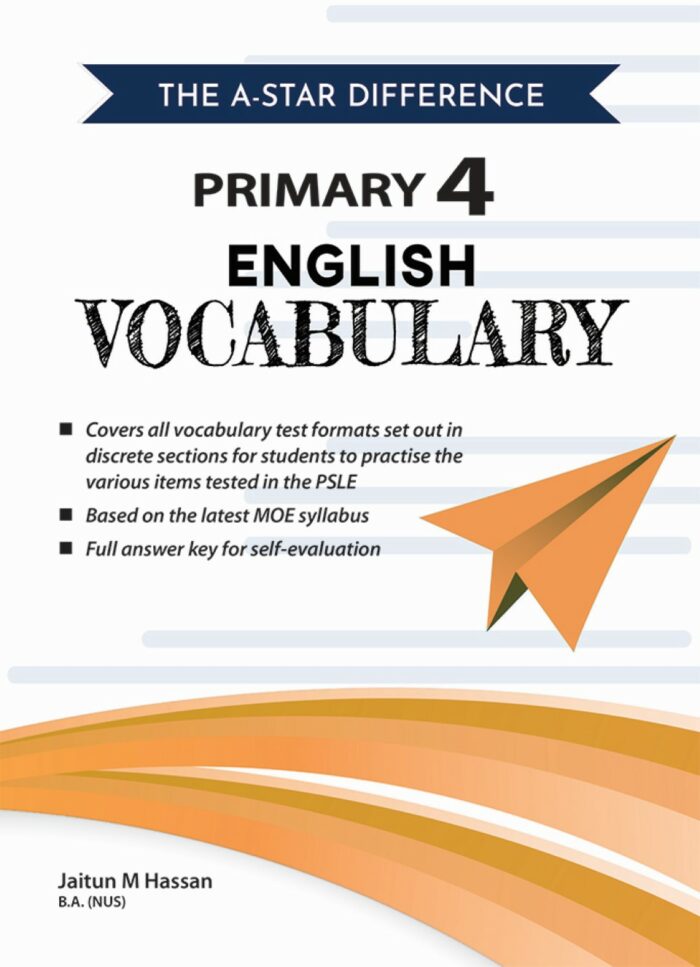Jaitun M Hassan has been working in educational book publishing for many years. After graduating from the National University of Singapore, she started work as an editor with a small but successful educational book publisher. In her work, she has, aside from editing manuscripts for publication, written a number of titles over the years for a number of educational book publishers. She specialises in both Primary and Secondary-level English.
Jaitun is the author of The A-Star Difference Primary 4 English Vocabulary. This book aims to provide students with items of vocabulary used widely in Primary 4 tests. Section A comprises multiple choice questions with emphasis on contextual clues to help students to remember word collocations and specific nuances of meaning. Section B is a selection of words that are commonly confused with one another. Section C contains text-based exercises; many of the connecting devices in language are tested in this section.
Today, Jaitun shares more about effectively improving one’s vocabulary.
About your book
- How should students use this book to effectively expand their vocabulary?
Pick an exercise from each topic daily. You do not have to finish all ten items that are in each exercise. As long as you do a few items of each exercise, it will provide you with good practice and you can get a feel of the subject requirements. You will feel more confident after having done this for at least a week.
2. Do students need to understand contextual clues well in order to excel in vocabulary tests?
You certainly have to decipher clues to meaning be it in sentences or complete passages. Start to look out for the meaning of new words in whatever you read. Try to understand what a sentence or passage is all about. It will not take you long. Just focus when you read.
3. Is it important for students to remember word collocations and the specific nuances of words?
Collocations are phrases that contain words that usually go together. For example – ‘big decision’, ‘closest friends’, ‘a long journey’ and so on.
Nuance is about adding colour to your writing – just a different way of saying the same thing. So instead of using ‘happy’, you would use ‘elated ‘or ‘jubilant’; and instead of saying ‘sad’, you can use ’miserable’.
These words give a different shade to the same feeling. It makes for interesting reading. You should learn to use them as they make for interesting reading and speaking. Avoid textbook uses of a word.
4. What are some common mistakes that you have observed in vocabulary tests?
Students have trouble when it comes to the usage of confusing words.
5. In addition to this book, what else can students do to improve their vocabulary?
Read as much as they can. Take note of new vocabulary and its usage. Make comparisons with words that share a similar meaning.
6. How can parents help their children improve their vocabulary?
Occasionally, toss out a sentence with a tough vocabulary item in them and ask for help from their children. Make that a regular practice but avoid overdoing it.
About Yourself/Work/Expertise
- Why did you choose to be in the publishing industry?
I have always loved books.
2. As a specialist in Primary and Secondary English, which areas do you think our students perform well in and which areas need improvement?
Students generally do well where short answers are required. They tend to flounder a little when long answers are required. This is an area that requires improvement at both levels.
3. How can weaker students improve their command of the English language?
A technique I grew up with was to copy out passages of good written English from newspaper articles, books and magazines. Students will improve his or her written English rapidly just by copying a page of good written English every day. However, this must be done at least three times a week. The student will certainly notice a huge difference after a month of doing this.
4. How has English as a subject evolved over the years?
I can say it has certainly become more interesting as a subject with students requiring to analyse and interpret passages well before answering questions.
Certain concepts taught in English Literature in the past are now being taught in English as a subject. This has certainly added flavour to the subject.
5. Lastly, would you have any other advice for students who are preparing for their English examinations?
You can only prepare for this subject by ensuring that you read regularly. There is no last hour or minute preparation for this subject.
Also, if you can write regularly (for example, short episodes of events in your life), that would help in the written part of the examination. Even if it is just one or two sentences, try to write regularly. You would then be well prepared.

